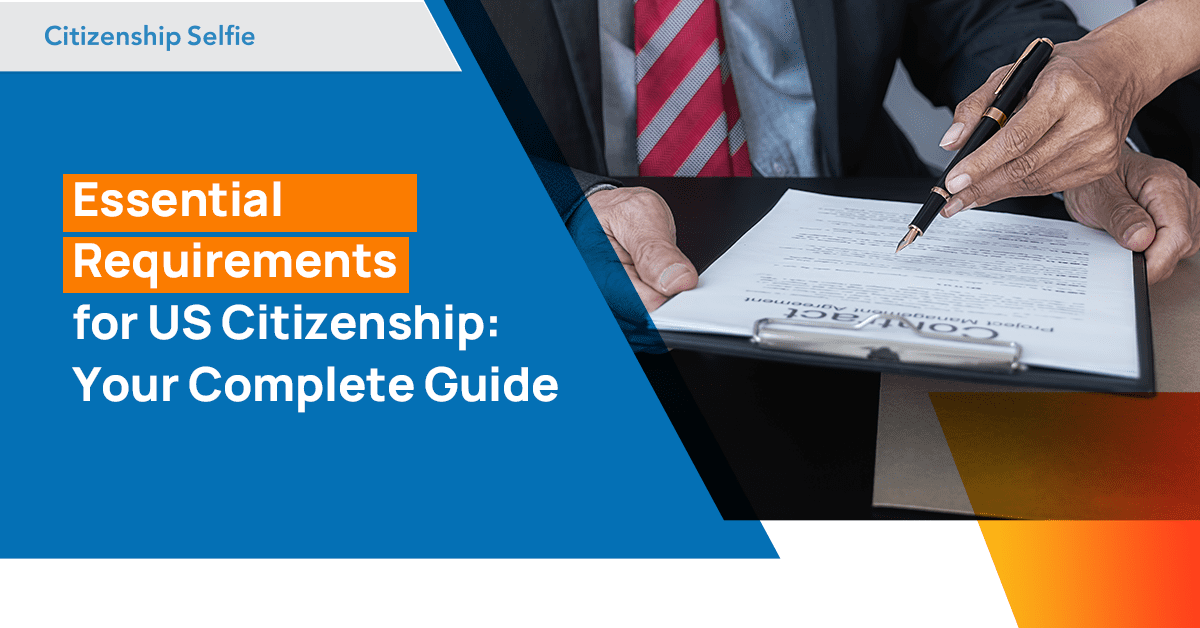Becoming a US citizen is a goal cherished by many. To attain this significant milestone, there are specific requirements that all naturalization applicants must fulfill. From age to language proficiency and good moral character, each step plays a vital role in the citizenship journey. Let’s delve into the essential requirements for US citizenship and how you can meet them confidently.
Essential Requirements for US Citizenship: Age
To begin the naturalization process, you must be at least 18 years old. However, there’s an exception for those applying based on wartime military service, where age is not a limiting factor. For more details on eligibility and exemptions, refer to our comprehensive guide on becoming a naturalized citizen.
The Continuous Presence Requirement
Aspiring US citizens must have continuously resided in the United States as green card holders for at least five years (or three years if married to a US citizen). The term “continuous” implies that during this 3-5 year period, you did not travel outside the United States for more than six months at a stretch (plus additional time while your US citizenship application is processed). However, you can leave the country; just ensure you return within six months every time.
Suppose you remain outside the United States for over six months as a green card holder. In that case, USCIS may assume that you abandoned your permanent residency, leading to the denial of your U.S. citizenship application.
Overcoming Presumption of Abandonment
Should you find yourself staying abroad for 181 to 364 days, you can avoid citizenship denial by convincing the USCIS officer that you didn’t intend to abandon your US residence during your time abroad (between six months and one year).
To succeed in this, you’ll need to provide evidence of your strong ties to the United States, such as:
- Maintaining employment in the United States and refraining from seeking employment abroad.
- Having immediate family members who remained in the United States.
- Retaining your home in the United States.
- Enrolling your children in US schools.
Staying Abroad for 365 Days or More
If your time abroad exceeds one year, USCIS will automatically consider that you abandoned your permanent residency in the United States. This leads to the denial of your US citizenship application, and you’ll need to wait before reapplying:
- If the waiting period for citizenship was five years, you must wait for at least four years and one day upon returning to the United States.
- If the waiting period was three years (as the spouse of a US citizen), you must wait for at least two years and one day upon returning to the United States.
How To Maintain Continuous Presence
To avoid losing permanent resident status, take necessary steps before leaving the US:
- Request a “re-entry permit” if planning to stay abroad for a year or more. Apply using Form I-131 before departure. A re-entry permit is valid for two years, and you must return before it expires.
- Apply for “preservation” of your permanent residence if engaged in specific government-approved work abroad for a year or more. File Form N-470 and apply for a re-entry permit as well.
- If unforeseen circumstances require staying abroad for an extended period without a re-entry permit, apply for a “returning resident visa.” Contact the nearest US embassy or consulate and follow their instructions, typically involving Form DS-117 and an interview.
Meeting the “physical presence” requirement is essential for US citizenship. Stay in the US for at least half of five years (913 days) or half of three years (548 days if married to a US citizen). Keep track of travel days, as they count as “physically present” in the US. Note: Certain military service members may have different requirements. Refer to the eligibility chart for naturalization.
Essential U.S. Citizenship Requirements: Residency
This requirement is distinct from continuous and physical presence obligations mentioned earlier.
To meet the residency requirement, you must have lived in the state or USCIS district where you’ll apply for citizenship for at least three months before naturalization. Certain exceptions apply based on military service. “State” includes the District of Columbia, Puerto Rico, Guam, US Virgin Islands, and the Commonwealth of the Northern Mariana Islands.
“USCIS district” refers to the area served by a specific USCIS field office, determined by your ZIP code. The “current physical address” you provide on Form N-400 must be your established residency, but exceptions exist. For instance, students relying on parents’ financial support can apply from either their school location or family’s home.
IMPORTANT REMINDERS:
- Notify USCIS within 10 days if you move after filing Form N-400.
- USCIS considers your “current physical address” for your residency, even if applying 90 days early.
Meeting the Essential Requirements for US Citizenship: Demonstrating Good Moral Character
USCIS broadly defines “good moral character” based on average citizen standards, case by case. Military-based applicants have exceptions (details here). To meet this requirement for US citizenship:
Avoid specific crimes, such as murder or defrauding the US government for immigration purposes, in the three to five years before applying for naturalization until the Oath of Allegiance. Prior conduct is also considered, evaluating character improvement.
Be truthful during the naturalization interview with a USCIS officer.
Have no two or more DUI convictions in the three to five years before applying for naturalization until the Oath of Allegiance. However, positive moral character during the offense period may be considered.
Key Requirements for US Citizenship: English Proficiency and Civics Knowledge
To become a USA citizen, you must pass a two-part naturalization test:
- English language test: Assessing your reading, writing, and speaking skills. It involves an interview, reading and writing simple sentences dictated by a USCIS officer.
- Civics test: Evaluating your U.S. history and government knowledge. Study either 20 or 100 questions, depending on your age and green card holder duration.
Some applicants are exempt from one or both tests. For detailed info, including preparation and study resources, refer to our USA citizenship exam guide.
Remember, filing your application is just the first step; obtaining citizenship may take several months or more.
Final Recap
Becoming a US citizen is a cherished goal for many, and it comes with its unique set of essential requirements for US citizenship. From age to good moral character, each step in the naturalization process holds significance. By understanding and fulfilling these essential criteria, you can confidently embark on your journey to US citizenship.
Remember, the road to citizenship may present challenges, but with determination and proper preparation, you can overcome them. Stay committed to meeting the residency, continuous presence, and physical presence essential requirements for US citizenship, while demonstrating good moral character and English proficiency.
With your sights set on becoming a US citizen, embrace the opportunities this status brings. Access government services, exercise your right to vote, pursue various professional aspirations, and be a part of shaping the nation’s future. Let Citizenship Selfie be your trusted partner in this transformative process, guiding you with expertise and support. Join us today and make your dream of US citizenship a reality.






